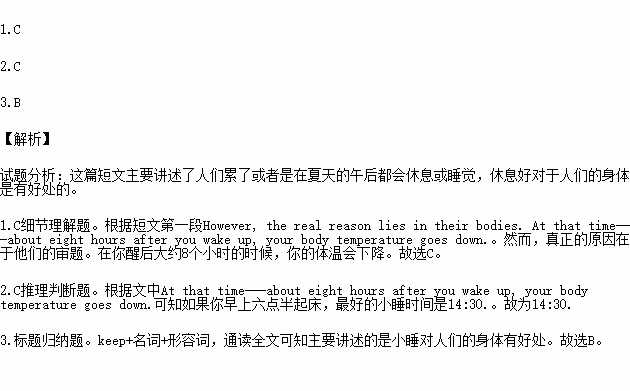题目内容
Are you sometimes a little tired and sleepy in the early afternoon? Many people feel this way after lunch. They may think that eating lunch is the cause of the sleepiness. Or, in summer, they may think it is the heat. However, the real reason lies inside their bodies. At that time – about eight hours after you wake up – your body temperature goes down. This is what makes you slow down and feel sleepy. Scientists have tested sleep habits in experiments where there was no night or day. The people in these experiments almost always followed a similar sleeping pattern. They slept for one long period and then for one short period about eight hours later.
In many parts of the world, people take naps(小睡) in the middle of the day. This is especially true in warmer climates(气候), where the heat makes work difficult in the early afternoon. Researchers are now saying that naps are good for everyone in any climate. A daily nap gives one a more rested body and mind and therefore is good for health in general. In countries where naps are traditional, people often suffer less from problems such as heart disease.
Many working people, unfortunately, have no time to take naps. Though doctors may advise taking naps, employers do not allow it! If you do have the chance, however, here are a few tips about making the most of your nap. Remember that the best time to take a nap is about eight hours after you get up. A short sleep too late in the day may only make you feel more tired and sleepy afterward. This can also happen if you sleep for too long. If you do not have enough time, try a short nap – even ten minutes of sleep can be helpful.
1.Why do people feel sleepy in the early afternoon according to the text?
A. They eat too much for lunch.
B. They sleep too little at night.
C. Their body temperature becomes lower.
D. The weather becomes a lot warmer.
2.If you get up at 6:30 am, what is the best time for you to take a nap?
A. About 12:30 pm. B. About 1:30 pm.
C. About 2:30 pm D. About 3:30 pm
3.What would be the best title for the text?
A. Just for a Rest
B. All for a Nap
C. A Special Sleep Pattern.
D. Taking Naps in Warmer Climate.
 黄冈天天练口算题卡系列答案
黄冈天天练口算题卡系列答案

 ), 并在其下面写出改加的词。
), 并在其下面写出改加的词。